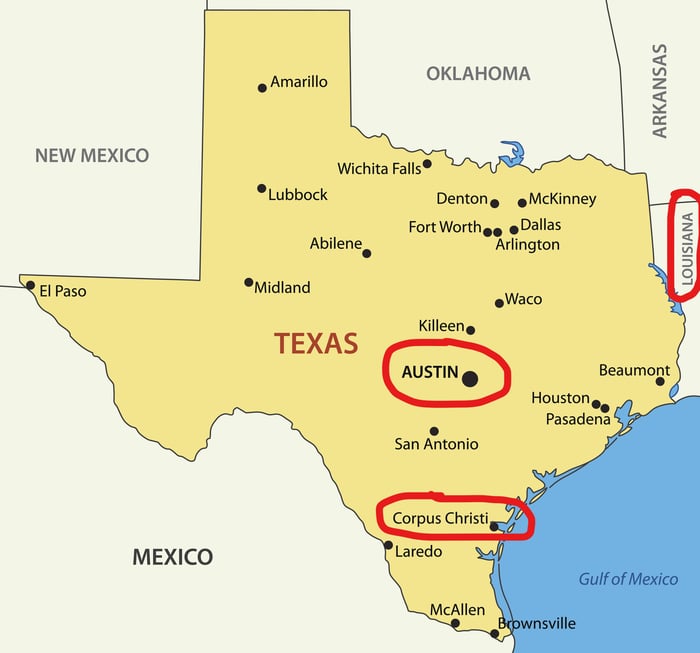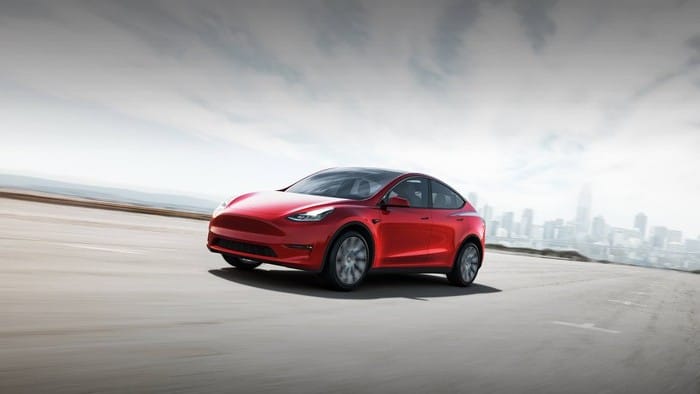This article was originally published on Fool.com. All figures quoted in US dollars unless otherwise stated.
Electric-vehicle (EV) pioneer Tesla, Inc. (NASDAQ: TSLA) is exploring the feasibility of developing a battery-grade lithium hydroxide refinery on the Gulf Coast of Texas or Louisiana, according to its late-August filing of an application seeking a property tax break in Texas.
Like other EV makers, Tesla's supply chain is dependent on lithium -- which has soared in price due to tight supply -- because it's used to produce the lithium-ion batteries that power EVs. Tesla also uses these batteries in its energy-storage products.
Here's what investors should know.
Tesla's proposed Texas lithium refining plant and timeline
In its application for a property tax break in Texas, here's how Tesla described its proposed operation in Robstown, Nueces County, which is about 16 miles west of Corpus Christi (see map below):
Tesla, Inc. is evaluating the possible development of a battery-grade lithium hydroxide refining facility, the first of its kind in North America, as well as facilities to support other types of battery materials processing, refining, and manufacturing and ancillary manufacturing operations in support of Tesla's sustainable product line.
Tesla will process raw ore material into a usable state for battery production. The process Tesla will use is innovative and designed to consume less hazardous reagents and create usable byproducts compared to the conventional process.
The final product, battery-grade lithium hydroxide, will be packaged and shipped by truck and rail to various Tesla battery manufacturing sites supporting the necessary supply chain for large-scale and electric vehicle batteries.

Image source: Getty Images. Red markings by author.
Tesla estimates the project will create 162 jobs. If it chooses the Robstown site, the company said construction could begin as early as the fourth quarter of 2022, and that it expects commercial operations would start by the fourth quarter of 2024.
A Louisiana site is in the running, too
As is typical for large companies that are considering building a significant new facility, Tesla is shopping around for tax-break deals from U.S. states.
In its Texas filing, it said the lithium "project could be located anywhere with access to the Gulf Coast shipping channel" and that it's also evaluating a site in Louisiana.
The company specified that the final product -- battery-grade lithium hydroxide -- will be "shipped by truck and rail to various Tesla battery manufacturing sites," so we can deduce that the Gulf shipping channel is likely needed for incoming raw materials.
Currently, in the United States, Tesla manufactures its batteries for its EVs and energy-storage products at its Gigafactory Nevada, which it operates with partner Panasonic. The company also has plans to produce batteries at its new Gigafactory Texas, which is located just outside the Austin city limits.
We can't know which state will provide Tesla with the most attractive tax breaks. But all other things being roughly equal, Texas would seem the frontrunner since the company already has operations in the Lone Star State. Last year, Tesla relocated its global headquarters from California to the Austin area, and it's currently ramping up EV production at Gigafactory Texas.
Tesla's possible lithium refinery site in Robstown is less than 20 miles from the Port of Corpus Christi and less than 200 miles by vehicle from its existing Austin area factory. Any site in Louisiana that's in close proximity to one of its seaports would be notably further away from Tesla's current Texas operations, per my review using worldportsource.com. So unless the Pelican State's economic package majorly dwarfs whatever Texas offers, it seems highly unlikely it will be home to a Tesla lithium refinery.
Tesla will also surely be evaluating weather factors, as hurricanes are not infrequent along the U.S. Gulf Coast.
Tesla's potential lithium production plans aren't a surprise
In the fall of 2020 at Tesla's "Battery Day," CEO Elon Musk announced the company had obtained the rights to 10,000 acres in Nevada where it planned to extract lithium from clay deposits using a proprietary process it had developed.
Tesla hasn't disclosed what lithium feedstock it aims to use in the battery-grade lithium hydroxide refinery that it's considering constructing. It's possible the company has developed a clay extraction technique, though it doesn't seem likely. No company is producing lithium from clay at commercial scale. (Lithium Americas is close to the commercialization stage at its lithium clay project in Nevada, but that project keeps being delayed by lawsuits from environmentalists and Native Americans.)
A more robust supply chain
Tesla having its own source of battery-grade lithium would be a positive for it and its investors. This would give it better control over its supply chain and lessen the probability that its business would be hurt by a global shortage of this critical battery material. Along with the availability benefit, it's also possible that Tesla could reap a cost benefit, at least eventually.
This article was originally published on Fool.com. All figures quoted in US dollars unless otherwise stated.









